
Chew Magna is a village and civil parish within the Chew Valley in the unitary authority of Bath and North East Somerset, in the ceremonial county of Somerset, England. The parish has a population of 1,149.

Bristol Harbour is the harbour in the city of Bristol, England. The harbour covers an area of 70 acres. It is the former natural tidal river Avon through the city but was made into its current form in 1809 when the tide was prevented from going out permanently. A tidal by-pass was dug for 2 miles through the fields of Bedminster for the river, known as the "River Avon New Cut", "New Cut", or simply "The Cut". It is often called the Floating Harbour as the water level remains constant and it is not affected by the state of the tide on the river in the Avon Gorge, The New Cut or the natural river southeast of Temple Meads to its source.

The Llandoger Trow is a historic public house in Bristol, south-west England. Dating from 1664, it is on King Street, between Welsh Back and Queen Charlotte Street, near the old city centre docks. Named by a sailor who owned the pub after Llandogo in Wales which built trows, the building was damaged in World War II, but remained in sufficiently good condition to be designated Grade II* listed building status in 1959. The pub is said to have inspired Robert Louis Stevenson to write of the Admiral Benbow Inn in Treasure Island and Daniel Defoe supposedly met William Dampier and Alexander Selkirk there, his inspiration for Robinson Crusoe. The pub is also supposedly haunted, with up to 15 ghosts and one little green ghoul, the best known being a small child whose footsteps can be heard on the top floor.

King Street is a 17th-century street in the historic city centre of Bristol, England.

Wookey Hole is a village in Somerset, England. It is the location of the Wookey Hole show caves.
There are many Grade II listed buildings in Bristol, United Kingdom.

All Saints is a closed Anglican church in Corn Street, Bristol. For many years it was used as a Diocesan Education Centre but this closed in 2015. The building has been designated as a grade II* listed building.

Christ Church is a Church of England parish church in Clifton, Bristol, England. It has been designated as a Grade II* listed building.

Cossham Memorial Hospital is a community hospital, founded in 1907, in Hillfields, Bristol, England.
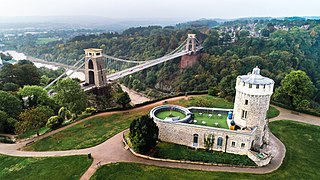
Clifton Observatory is a former mill, now used as an observatory, located on Clifton Down, close to the Clifton Suspension Bridge, Bristol, England.
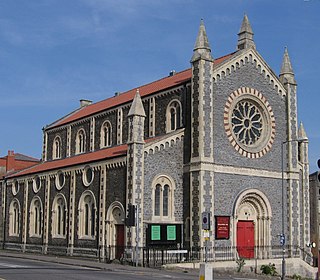
The City Road Baptist Church is a Baptist church on Upper York Street, Stokes Croft in Bristol, England.

The Clarks Wood Company warehouse is a 19th-century industrial building in Silverthorne Lane, Bristol.

The Gardiners warehouse is on Straight Street, Broad Plain, Bristol, England.
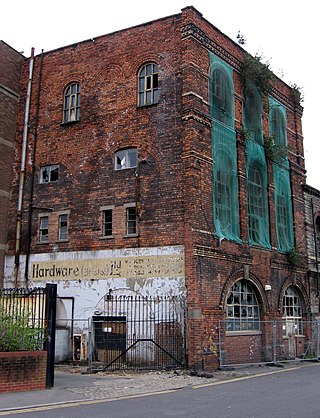
The Warehouse premises of Hardware (Bristol) Limited is on Old Bread Street, Bristol, England.

The 35 King Street is a former cork warehouse in King Street, Bristol, England, currently housing an Indian restaurant and serviced office space.

Bristol Byzantine is a variety of Byzantine Revival architecture that was popular in the city of Bristol from about 1850 to 1880.

14 and 15 King Street is the address of an historic warehouse building in King Street, Bristol, England. It was built around 1860 and is now occupied by a restaurant and offices.
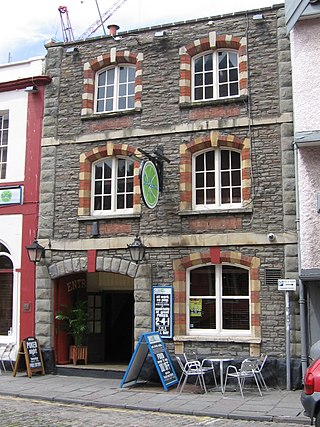
32 King Street is the address of a historic warehouse building in King Street, Bristol, England.
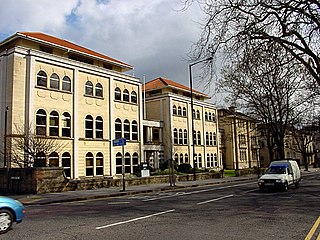
The BBC campus, Broadcasting House Bristol, is located on Whiteladies Road, Bristol. The first building to be occupied was 21/23 Whiteladies Road, which was built in 1852 and is a Grade II listed building, with four radio studios. It was formally opened by the Lord Mayor of Bristol on 18 September 1934. The BBC has been on the same site ever since.



















